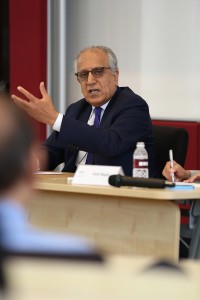There is a need to reflect on the factors that have and continue to arouse instability in the region, including the rise of ISIS (Islamic State of Iraq).
 Ambassador Zalmay Khalilzad (L), President of Gryphon Partners, and Kanti Prasad Bajpai (R), Wilmar Professor on Asian Studies at the LKY School.
Ambassador Zalmay Khalilzad (L), President of Gryphon Partners, and Kanti Prasad Bajpai (R), Wilmar Professor on Asian Studies at the LKY School.
Ambassador Zalmay Khalilzad, President of Gryphon Partners said there is a need to reflect on the factors that have and continue to arouse instability in the region, including the rise of ISIS (Islamic State of Iraq).
The most long-term factor has been the impact of colonialism. The erection of unnatural borders resulted in Sunni or Shia minorities in countries like Iraq and Syria, which has created sectarian conflict. Moreover, the fact that colonial governments relied
on the promotion of minorities to control their colonies is a key source of the division today. Due to this legacy, loyalty to the state lacks universality.
The region also suffers from an ideological crisis. Being more secular is perceived as a threat to Arab nationalism and the unity of the Muslims. This is particularly for the Salafis who are nostalgic for return to the time of the prophet.
 Additionally, globalisation and information as evidenced in the Arab spring has facilitated pressure groups and empowerment of civil society. This has enabled successful challenges, and even overthrow of authority. But there is often little success
in agenda setting and governance thereafter.
Additionally, globalisation and information as evidenced in the Arab spring has facilitated pressure groups and empowerment of civil society. This has enabled successful challenges, and even overthrow of authority. But there is often little success
in agenda setting and governance thereafter.
Such crisis of governance in the region also arises from the lack of economic development, the inability to provide key public goods such as access to clean water, security, and the issue of corruption. Ambassador Khalilzad pointed out the lack of inclusive
governance, the discrimination of minorities, and the desire for revenge once minority groups rise to power. The absence of democracy, accountability and internal order in the region has thus enabled the germination of extremism and terrorism.
 Another issue is the fluctuation in foreign power dynamics with US dominance having overshadowed Britain and France after the cold war. The US disengagement in the region with the Obama administration has seen countries like Russia, China, and India
show greater interest in the region.
Another issue is the fluctuation in foreign power dynamics with US dominance having overshadowed Britain and France after the cold war. The US disengagement in the region with the Obama administration has seen countries like Russia, China, and India
show greater interest in the region.
Whilst these issues continue to undermine peace and stability in the region, the most important and striking feature of the region’s crisis is the role of regional players such as Iran, Egypt, and Saudi Arabia. The competitive intervention of these three
nations seeks to take on the role previously occupied by foreign powers in shaping the region. Their attempts for pre-eminence and the creation of a new balance of power have resulted in a proxy war where local actors are leveraged to exert influence
and promote their divergent interests. Iran, in particular, plays a significant role in shaping the crisis through its support of Shiite regimes, groups, political parties, and militias to promote its political agendas. Whilst Saudi Arabia has been
a status quo power, Egypt has been a transformative power with regards to its ambitions in the region.
The multi-dimensional nature of the conflict and instability in the Middle East make it a very complex issue. With regional powers continuing to be on diverging sides, sensitive divides will continue to be inflamed, and will thus contribute immensely
in exacerbating the volatile situation.
On 15 April 2015, Ambassador Zalmay Khalilzad, President of Gryphon Partners gave a talk entitled “The Current Struggle for the Middle East: Regional Dimensions” at the LKY School. For upcoming events at the LKY School, please visit our website.
Awa Tourey is a MPP Student at the LKY School. Her email is a0122834@u.nus.edu